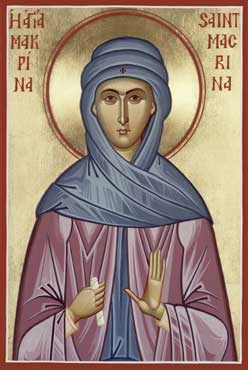
Firstly, Macrina points us to how we may approach intellectual understanding of God, through the human pathway of the mind. Indeed Gregory of Nyssa calls her 'the Teacher' in his writings: high praise from such a source and an acknowledgment of her contribution to the sublime theological work of the Cappadocian Fathers. This teased out the distinctive and mutually enriching features of God as Holy Trinity: Father, Son and Holy Spirit. How much Macrina, as the Teacher, offer in this we will never know. Yet it appears that she at least influenced Gregory in two vital features which are still crucial to a living Faith today. Indeed, we might even say that these are even more important today than ever before. The first is an understanding of faith as mystery. Thus, for Macrina and her Cappadocian briothers, our theology is an apophatic task: which is to say that God is best defined by what we know God is not rather than by some speculation we have of God. For whatever we say about God can only be a drop in the ocean and risks becoming an idol. So Christian beliefs, we might say, following Gregory and Macrina, are only symbols to help us to love God and one another better. We need to hold them humbly and in constant search of further enlightenment, not as rules, or worst still, weapons, to confine and beat up ourselves and others. Secondly, flowing out of this understanding of faith as love and God as mystery, Macrina and Gregory both seem to have held to the view that, ultimately, God would bring all things and all people into loving unity. This understanding of God's salvation as ultimately including everyone is still controversial today, and it most certainly does not mean that great perpetrators of evil simply go to heaven in an easy way. Macrina and Gregory were only repeating what St Paul and others had said, that in the end God will be 'all in all' (1 Corinthians 15.28). Over the ages of ages, in the perspective of eternity, God's love will triumph. For God, said Macrina and Gregory, is eternal love, not everlasting judgement.
The second major pointer Macrina offers us, is to how we may approach physical understanding of God, through the human pathway of the body. Now she was a woman of her times, in which privations of the body were lauded as key elements in a holy life. Her own classic ascetic model is not one for every age and every one. Yet having what we might call a transcendent understanding of the body is a healthy thing. Macrina hardly avoided the physical aspects of life. Indeed, as the eldest child of ten, from an early age, on her father's death, she shared with her mother leadership and care of the family in practical as well as other ways. Yet she had a strong awareness that if we are tied down by assumed 'normal' expectations of our bodies and lives then we fail to flourish as God wants us to flourish. This comes out in her attitude to conventional marriage and family life. She was betrothed, as was the custom in Roman days, to be married at age twelve. When her fiance died however, she persuaded her parents that the intended marriage was as good as an actual marriage. Thereby she could live, so to speak, as a widow, independently from a man. Christian Faith, she understood, unlike right wing Christians later, is not about conforming to the moral demands and gender expectations of a particular culture. Rather God calls us to a deeper and wider freedom, sharing in that love and mystery which transcends all passing human forms and ideas.
For thirdly, and most importantly, Macrina points us to how we may approach prayerful understanding of God, through the human pathway of the soul. Partly this is through the importance of sharing in a spiritual community. Macrina indeed was an example of female leadership in this. After her siblings were raised, Macrina led her mother and others into the formation of a monastic community, which, with the help of another brother Peter, was later extended into a double monastery, with a men's section. In doing so, Macrina thus both enabled other women to find space and freedom for themselves in God rather than be limited by the expectations of men and she also continued, alongside this, to develop the positive web of loving relationships she nurtured with men. At the heart of such communion, and of life's vicissitudes however, lay Macrina's profound understanding of the transcendent love and mystery of God. As her brother Gregory recalled, in On the Soul and the Resurrection, in her last deathbed conversation Macrina taught that foolishness and misunderstanding are the cause of too much human grief. These arise, she rightly said, from the failure to live by the reality that the flesh passes away, but the soul remains. For our bodies do matter, like the bodies which Macrina herself cared for, yet they only live within something much greater: our souls. At death therefore, said the 'Teacher' Macrina', our soul knows all that it knew when the body lived, and its knowing derives from what the body experienced. And the soul can still contemplate God and will continue to grow like God insofar as it sees God's beauty. In this is our hope, and our destiny. Amen.
by Jo Inkpin, for the feast of Gregory of Nyssa and Macrina the Younger, 19 July 2018
 RSS Feed
RSS Feed